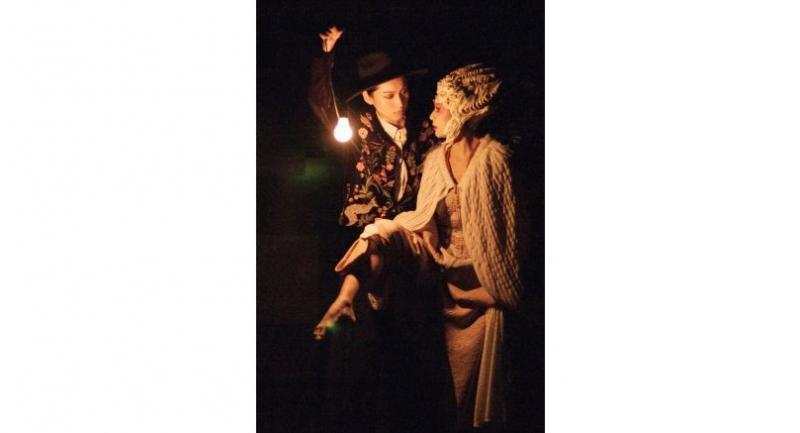Crossing borders, blurring boundaries

Taiwan’s new intercultural music theatre work has its international premiere at Chula
PART OF THE showcase in the inaugural Bangkok International Performing Arts Meeting (BIPAM), MOVE Theatre’s “Kuang Qi” will be at Sodsai Pantoomkomol Centre for Dramatic Arts from Wednesday to Friday.
Presented by Taiwan’s Ministry of Culture, the Taipei Economic and Cultural Office in Thailand and Chulalongkorn University’s “World Performances @ Drama Chula” programme, “Kuang Qi” is “music theatre”, combining traditional opera, a traditional opera percussion ensemble, contemporary music, body movements and theatre.
The story revolves around two noted female characters of Chinese opera: Du Li-niang (“The Peony Pavilion”) and Zhu Ying-tai (“The Butterfly Lovers”). Script-wise, it wonders what would happen if Du saw and had a relationship in her dreams not with a handsome man, but a woman in a man’s disguise and asks whether her desires and repression remain the same. By using the female archetype in traditional opera to delve into female desire and its transformation and with language and body movements as the means of expression, “Kuang Qi” exhibits a high level of gender awareness that transcends time and space.

Queer Taiwan: Contemporary dance artist Kuo Chiumiao portrays Du Liniang (“Peony Pavilion”) and in her dream is actress Kuan Ching as Zhu Yingtai ("Butterfly Lovers"), in a man's disguise!
Music-wise, the mastermind is MOVE Theatre’s resident composer and music director Lin Kuei-ju, who explains the title comes from two phonetics used in the oral notation of the Peking opera percussion (Luogu). “Kuang” represents the sound of the heavy stroke performed by the entire ensemble while ‘Qi’ is the heavy stroke of the cymbals. Together they become one of the most frequently performed rhythmic patterns of the Peking Opera percussion.”
“In this production, we explored the possibilities of creating a musical style that combined Peking opera percussion with Western percussion as well as a new interpretation of two noted female characters as an attempt to search for a continuous conversation with this traditional art form in modern times. So we took the homonyms of ‘Kuang Qi’ as our title, which, in Mandarin, suggested other meanings and hopefully would create new images for the audience. By so doing, we also hope to reflect the ideas and spirit behind this interdisciplinary collaboration,” Lin says.

“All collaborating artists [from different backgrounds and disciplines] were pretty much on the same page. The actor, dancer and musicians rehearsed separately in the very beginning in order to maintain efficiency. But we would visit each other. For instance, I would go to the theatre and dance rehearsals to get a sense of what the music might be. And then [director and playwright] Daniel Wang and [choreographer] Tung I-fen would receive recordings from our music rehearsals as a reference to work on the details of the acting and dance. We went back and forth for a while, with some materials being revised or given up along the way. So when everyone met together at the final stage of the rehearsal, all the developments and integration of materials were really collective efforts.
“I received the commission from Taiwan’s newly-established Xiqu Centre to create a new work,” Lin continues. “Their request was for something to do with the traditional performing arts but they kindly give me total control over what and how to do it. The backgrounds of the artists are not rooted in traditional art forms but we’ve all collaborated with traditional artists in different ways. I appreciate traditional arts very much and I believe that if they are to have an ongoing influence and impact in modern culture, they must have a continuous conversation with it. So we decided to accept this challenge.
“Traditional and modern theatres in Taiwan of course have very different, even conflicting in aesthetics and practice. But I think we face some very similar issues – for example, finding our own voices in our works and looking for new audiences. So there have been artists of both ends try to collaborate together as a way to deal with the issues mentioned above. Of course there are many different approaches. But Taiwan continues to have artists stepping out of their comfort zones, learning the perspectives of the others, and trying to work together.”

“Kuang Qi” had its world premiere at Taiwan Traditional Theatre Centre less than two months ago and this BIPAM outing is its international premiere.
Other BIPAM Showcase productions, all at Bangkok Art and Culture Centre (BACC), are “Co/Exist” by FullFat Theatre (Thailand), “Little Red in the Ruins” by For What Theatre (Thailand), “Full Service” by Daniel Hellmann (Switzerland), “Fight! Palast #membersonly” by Peng! Palast (Switzerland) and “We Women II: Trigger Warning” by We…Women Team (India). Adding these evening programmes to the talks, discussions, workshops, masterclasses and networking opportunities during the daytime, BIPAM is indeed making the ongoing Bangkok Theatre Festival more international and more exciting than ever before.
PLENTY TO WATCH THIS WEEK
“Kuang Qi” is at Chulalongkorn University’s Sodsai Pantoomkomol Centre for Dramatic Arts Wednesday and Thursday at 730pm and Friday at 2pm and 8pm.
Tickets are Bt600 at (081) 559 7252.





